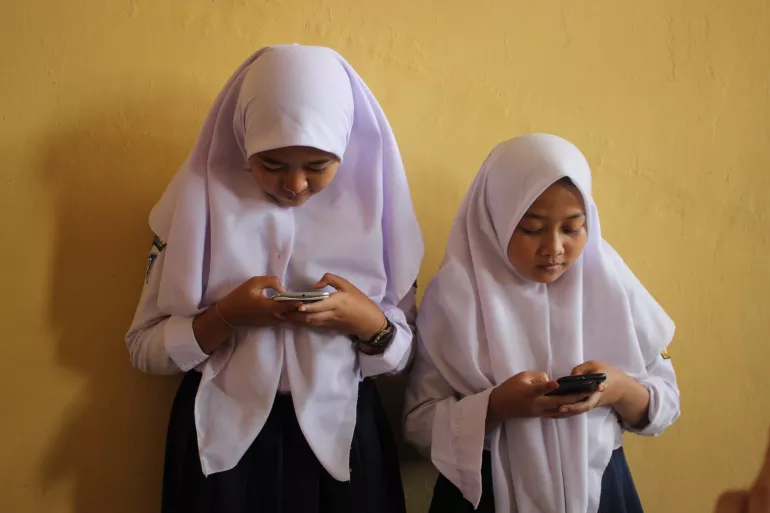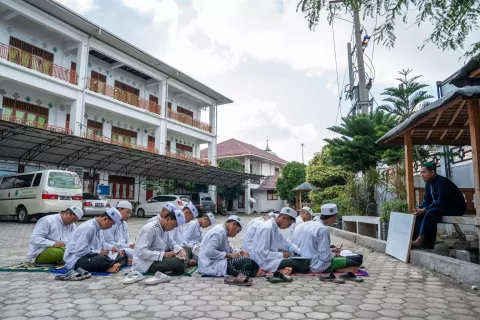Up to 56 per cent of online child sexual exploitation and abuse in Indonesia goes undisclosed and unreported, according to new survey
On National Children’s Day, the Ministry of Women’s Empowerment and Child Protection and UNICEF launch 3-year programme to promote child safety online

- Available in:
- English
- Bahasa Indonesia
Jakarta, 23 July 2022 – Between 17 and 56 per cent of children in Indonesia who were subjected to various forms of online sexual exploitation and abuse or other unwanted experiences on the internet did not tell anyone, according to a new report by UNICEF, Interpol and ECPAT funded by the Global Partnership to End Violence against Children.
Disrupting Harm in Indonesia, released ahead of National Children’s Day on 23 July, presents evidence about online child sexual exploitation and abuse according to data from a household survey with 995 children and parents, a survey with frontline service providers and interviews with government duty-bearers and service providers. The research was conducted between November 2020 and February 2021 among children ages 12-17.
The report finds that children in this age group are highly active Internet users with 95 per cent going online at least once a day. Two per cent of children – some 500,000 children in Indonesia – reported being victims of online sexual exploitation and abuse in the past year. The report notes that this figure is likely under-reported because the topic is sensitive and traumatic for many children to discuss. Since the report only covers incidents in the last year, the total number of children who have had these experiences over their lifetime is estimated to be much higher.
Incidents reported by children in the survey include being blackmailed to engage in sexual activities, having sexual images of them shared without their permission or being coerced to engage in sexual activities through promises of money or gifts.
Children experienced exploitation and abuse mainly through social media via platforms such as WhatsApp, Facebook and Facebook Messenger. Up to 56 per cent did not disclose their experiences to anyone. Those who did told a friend or a sibling rather than a caregiver or trusted adult. Only one child who had received unwanted sexual content reported to the police and only one child who had received an offer of money or gifts in exchange for sexual content called a helpline.
The reasons given by victims for not disclosing their experiences include a lack of awareness of where to report or whom to talk to, a sense of having done something wrong, thinking nobody would understand them, concerns about getting into trouble, feelings of shame and embarrassment and concerns that it would cause trouble for the family.
“The internet provides children and young people with limitless opportunities to access information, culture, communication and entertainment that can ignite their creativity and broaden their horizons,” said Acting UNICEF Representative Robert Gass. “But these opportunities also come with serious risks. All of us – caregivers, communities, teachers, digital platforms and the government – need to understand the threats of online sexual exploitation and abuse and make children’s online safety a priority.”
The Disrupting Harm report outlines several recommendations for more coordinated and sustained efforts from multiple stakeholders to better protect children from the risks of online sexual abuse and exploitation. It flags the critical need to educate children and communities about safe online engagement, for which parents and caregivers play a key role. The report also calls for further action to criminalise all acts of online sexual exploitation and abuse through existing legislation, policies and standards in Indonesia.
“Prevention of online child sexual exploitation and abuse is in line with the new law on Criminal Act of Sexual Violence, calling all members of the society to take immediate and tangible actions to prevent and respond to sexual violence, including online sexual violence” said Minister of Women’s Empowerment and Child Protection, I Gusti Ayu Bintang Darmawati.
Based on the key findings of the Disrupting Harm report, the Ministry of Women’s Empowerment and Child Protection and UNICEF are launching the Prevention of Online Child Sexual Exploitation and Abuse (OCSEA) programme, a three-year partnership to provide safe and friendly environments for children online. The programme includes activities to educate and empower children and their caregivers, build evidence to inform policies, advocacy and programming, and strengthen child protection policies, programmes and services.
# # #
About UNICEF
UNICEF promotes the rights and wellbeing of every child, in everything we do. Together with our partners, we work in 190 countries and territories to translate that commitment into practical action, focusing special effort on reaching the most vulnerable and excluded children, to the benefit of all children, everywhere. For more information about UNICEF Indonesia and its work for children, visit www.unicef.or.id
For more information, please contact:
Kinanti Pinta Karana, Communication Specialist, UNICEF Indonesia. Email: kpkarana@unicef.org
Mobile: +62-815-880-5842
Media contacts
About UNICEF
UNICEF promotes the rights and wellbeing of every child, in everything we do. Together with our partners, we work in 190 countries and territories to translate that commitment into practical action, focusing special effort on reaching the most vulnerable and excluded children, to the benefit of all children, everywhere.
For more information about UNICEF and its work for children, visit www.unicef.org.




